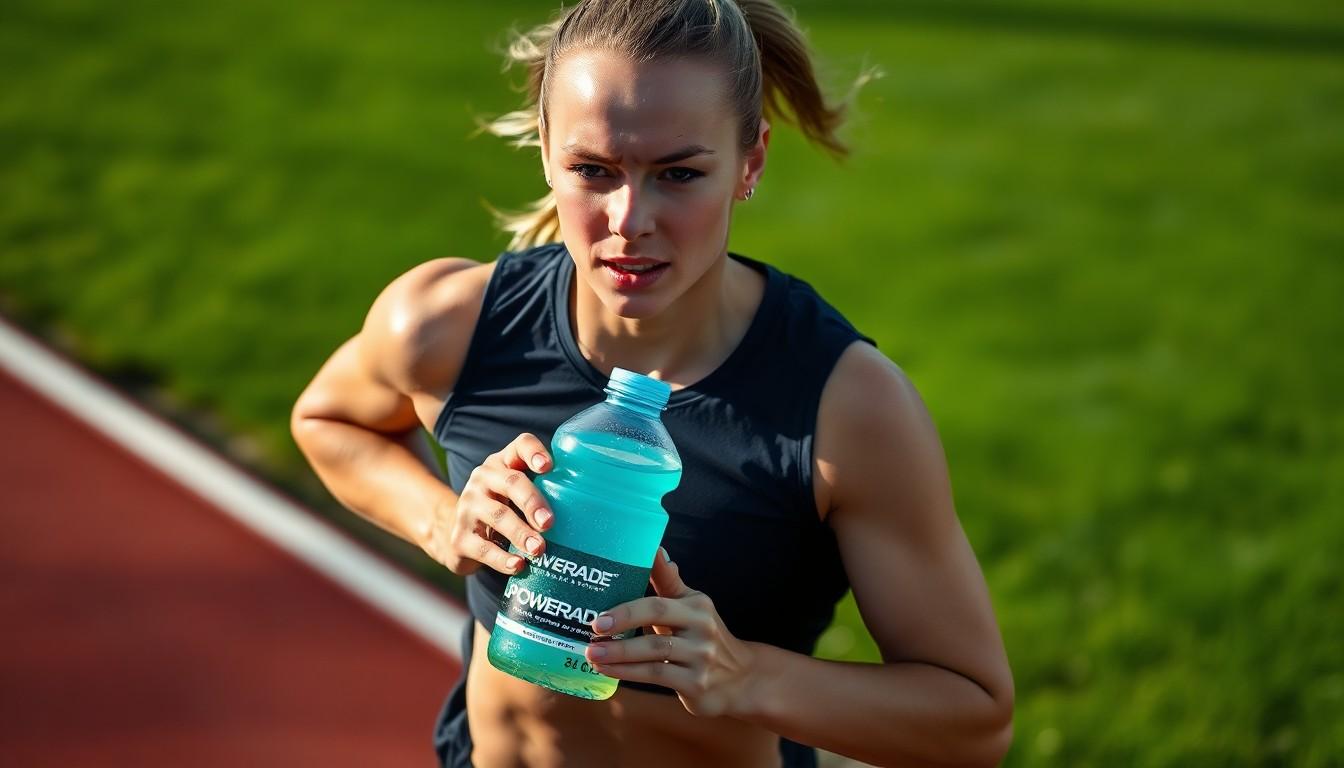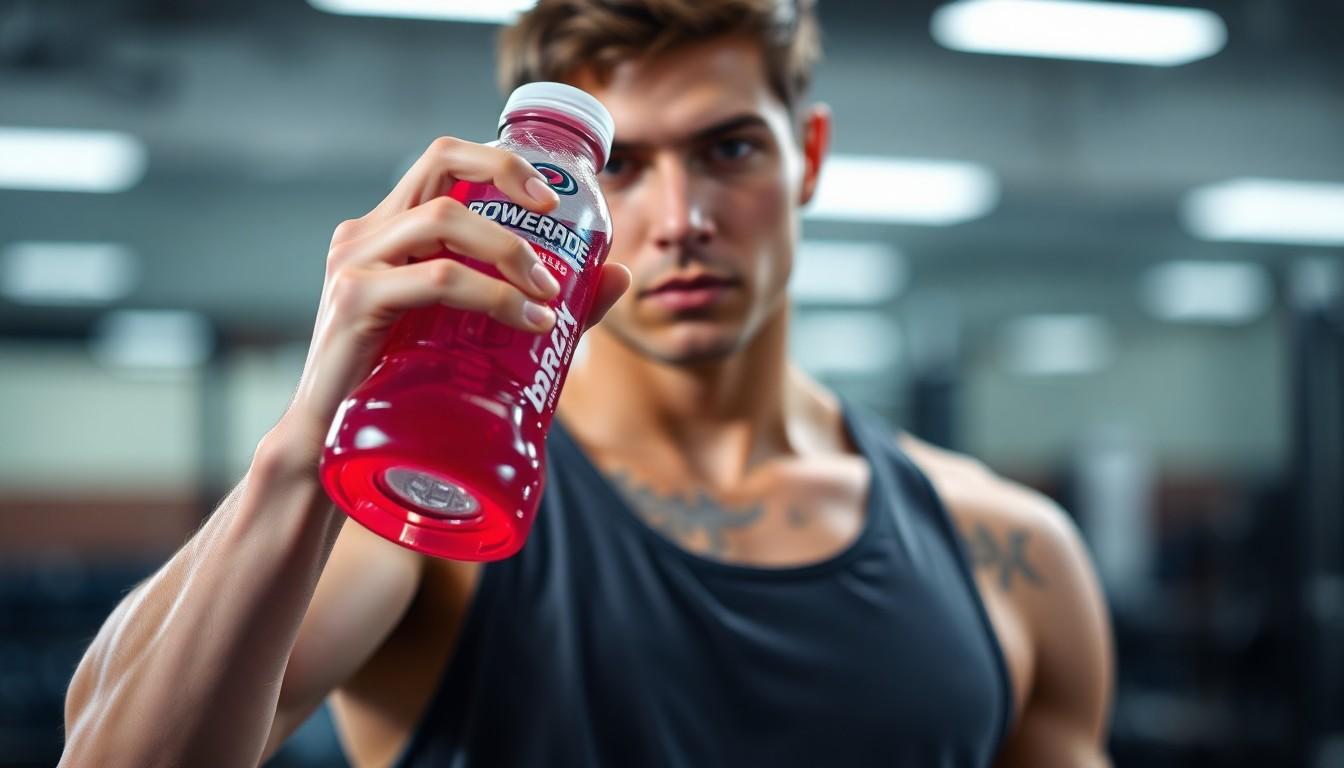Table of Contents
ToggleWhen it comes to quenching thirst after a sweaty workout, Powerade is often the go-to choice for athletes and weekend warriors alike. But before you guzzle down that vibrant blue elixir, it’s worth taking a peek at the nutrition label. Is it a magical potion or just another sugary drink in disguise?
Packed with electrolytes and a splash of flavor, Powerade promises to replenish what you lose during intense activities. But how does it stack up against other sports drinks? With a careful look at the nutrition label, you’ll discover if it truly delivers on its promises or if it’s just a colorful way to hydrate. Dive in and find out if Powerade deserves a spot in your gym bag or if it’s time to switch to something a little more… refreshing.
Overview of Powerade
Powerade serves as a popular rehydration option among athletes and fitness enthusiasts. The drink contains essential electrolytes, including sodium and potassium, which help replenish nutrients lost during physical activities. Various flavors, such as Mountain Berry Blast and Fruit Punch, provide appealing choices for consumers. Each serving contains approximately 50 calories, making it a low-calorie option compared to some alternatives.
Ingredients include high fructose corn syrup, citric acid, and electrolytes, which contribute to its taste and functionality. Powerade’s formula aims to provide quick recovery during strenuous exertion. Sodium helps maintain fluid balance, while potassium aids muscle function.
Examining the nutrition label reveals the overall nutritional content, with 13 grams of sugar per serving. This sugar content can create a quick energy boost but may raise concerns regarding excessive sugar intake for some individuals. Vitamin B6 and B12 enhance the drink’s advantages by supporting energy metabolism.
Comparing Powerade to other sports drinks underscores differences in ingredients and nutritional profiles. Brands like Gatorade and Bodyarmor offer alternatives with distinct formulas and flavor profiles. Athletes often choose Powerade for its competitive pricing and availability across numerous retailers.
Evaluating personal hydration needs helps determine whether Powerade is an appropriate choice. It’s crucial to assess how well it aligns with specific fitness goals and dietary requirements. The drink’s balance of flavors and electrolytes makes it an attractive option for hydration after workouts.
Nutritional Components of Powerade

Powerade’s nutritional label reveals important details that address hydration needs for athletes and fitness enthusiasts. Understanding these components aids in making informed choices.
Calories and Serving Size
Each 20-ounce serving of Powerade contains approximately 50 calories. This modest calorie count helps provide quick energy replenishment during workouts. Consumers should be aware that serving sizes can vary by flavor; however, the standard remains consistent across most varieties. For athletes looking to balance calorie intake, Powerade offers a convenient option amid various sports drinks.
Carbohydrates and Sugars
Powerade features around 13 grams of carbohydrates per serving, primarily derived from sugars. These 13 grams boost energy efficiently, aiding performance during high-intensity activities. While some may worry about sugar content, it’s essential to recognize that quick energy sources are often beneficial during intense workouts. The simple sugars in Powerade help replenish glycogen stores after strenuous exercise, making it a practical choice for rapid recovery.
Electrolytes
Powerade is rich in electrolytes, providing essential minerals like sodium and potassium. Each serving contains approximately 160 milligrams of sodium and 40 milligrams of potassium, crucial for hydration and muscle function. These electrolytes play a vital role in replenishing what athletes lose during sweating. Awareness of these mineral levels supports optimal performance during extended physical activity, making Powerade a strong contender in the sports drink market.
Vitamins and Minerals
Powerade includes vitamins B6 and B12 in its formulation, supporting energy metabolism effectively. Each serving contains about 1 milligram of vitamin B6 and 2.4 micrograms of vitamin B12. These vitamins help convert food into energy and maintain overall health. Athletes and active individuals benefit from these added nutrients, as they promote stamina and improve recovery efforts post-exercise.
Comparison with Other Sports Drinks
Powerade competes with leading sports drinks like Gatorade and BodyArmor, each offering unique nutritional profiles and flavor selections.
Powerade vs. Gatorade
Powerade contains roughly 50 calories and 13 grams of sugar per 20-ounce serving. Gatorade, on the other hand, offers about 80 calories and 21 grams of sugar in a similar serving. Sodium content is critical for hydration; Powerade has approximately 160 milligrams, while Gatorade’s levels vary by flavor, often reaching up to 160 milligrams as well. Potassium also plays a vital role, with Powerade providing 40 milligrams compared to Gatorade’s varying amounts. With added vitamins B6 and B12, Powerade supports energy metabolism, which aligns well with high-intensity activities. Gatorade’s formula caters primarily to replenishing electrolytes lost during exercise.
Powerade vs. BodyArmor
BodyArmor markets itself as a more natural alternative, featuring coconut water as a key ingredient. Powerade offers a traditional sports drink formula loaded with electrolytes essential for hydration. BodyArmor contains 70 calories and 18 grams of sugar, significantly higher than Powerade. Each beverage provides essential electrolytes, but BodyArmor includes additional vitamins like A, C, and E, promoting immune health. Powerade still excels with its lower calorie and sugar content, appealing to those seeking a quick energy boost without excessive sweeteners. Both drinks provide rehydration benefits, making them suitable for athletes and active individuals.
Health Considerations
Powerade offers specific health benefits and potential drawbacks that users should consider when choosing a sports drink for hydration.
Benefits of Powerade
Powerade provides quick energy, containing about 50 calories and 13 grams of sugar per 20-ounce serving. Hydration benefits arise from its electrolyte content, with approximately 160 milligrams of sodium and 40 milligrams of potassium per serving. These nutrients help replenish lost fluids and prevent muscle cramping during intense activities. Additionally, Powerade contains vitamins B6 and B12, which support energy metabolism, enhancing stamina and recovery. The various flavors, such as Mountain Berry Blast and Fruit Punch, make it an enjoyable option for active individuals seeking hydration after workouts.
Potential Drawbacks
Consumption of Powerade leads to concerns regarding sugar intake, as each serving contains 13 grams of sugar. Excessive sugar can contribute to negative health effects, including weight gain and increased risk of chronic conditions. While the electrolyte balance is beneficial, individuals with specific dietary concerns may find the artificial flavors and colors questionable. Powerade’s calorie count remains lower than some alternatives, yet nutrition-conscious athletes might prefer options with fewer additives. Overall, understanding these factors helps individuals assess if Powerade aligns with their personal health goals.
Powerade stands out as a viable option for those seeking hydration and energy after intense workouts. With its electrolyte content and vitamins B6 and B12, it supports recovery and performance. While the sugar content raises some concerns, its lower calorie profile compared to competitors makes it appealing for many fitness enthusiasts.
Ultimately, individuals should assess their personal hydration needs and fitness goals when choosing Powerade or any sports drink. By understanding the nutritional components and potential drawbacks, they can make informed decisions that align with their health objectives.






